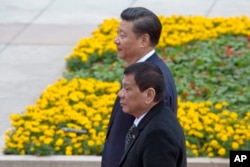China is not happy with Japanese Prime Minister Shinzo Abe's high-profile visits to the Philippines, Australia, Indonesia and Vietnam over concerns that he may be trying to pull the rug out from under Beijing's efforts to pacify its neighbors in and around the South China Sea.
"The Japanese leader spared no effort in driving a wedge and playing up the regional tension, showing his ulterior motives and extremely unhealthy mindset," Foreign Affairs spokeswoman Hua Chunying told reporters. She said Abe's Asia tour came just as Beijing and its neighbors have stabilized the situation in the South China Sea.
In the Philippines, which is hosting Southeast Asian leaders this year, Abe said the South China Sea issue is linked directly to regional peace and stability and is a "concern to the entire international community." He also welcomed Philippine President Rodrigo Duterte's efforts to improve Manila's ties with Beijing following the Philippines' victory in an arbitration ruling last year declaring China's maritime claims invalid.
China has refused to recognize the arbitration decision and has warned the United States and other countries not involved in the territorial row not to meddle in the disputes, which Beijing wants to settle through one-on-one negotiations.
A commentary by the state-run Xinhua News Agency said although Abe raised the arbitration ruling with Duterte, he "will probably feel disappointed" as Duterte made no direct mention of the disputes. In fact, Duterte described Japan as a "friend closer than brother" during a state dinner for Abe.
"We are friends who are bound by shared common resolve to uphold democracy, adherence to the rule of law, and the peaceful settlement of disputes," Duterte said.
In both the Philippines and Vietnam, Abe pledged investment opportunities and support for the countries' coast guards in protecting their waters. He said that Japan will provide new patrol vessels to both nations.
Philippines files rare protest against China
The Philippine foreign secretary has filed a verbal protest to China over Beijing's placing of anti-aircraft and anti-missile weapons on its man-made islands in the South China Sea - a rare move since Manila warmed up to Beijing last year.
"I just want to assure the Filipino people that when we take action at engaging China in this dispute, we do not want to take such aggressive, provocative action that will not solve the problem," Perfecto Yasay told CNN Philippines. He added: "We cannot engage China in a war."
Beijing says the artificial islands are intended to boost maritime safety in the region while downplaying their military utility. They also buttress China's claim to ownership of practically the entire South China Sea.
Vietnam, China agree to set aside maritime disputes
Days before Japanese Prime Minister Shinzo Abe visited Vietnam, the country's Communist Party chief Nguyen Phu Trong led a high-power delegation to Beijing for talks with President Xi Jinping.
Vietnam has had complicated relationship with China: both are nominally allies ruled by communists, but unresolved maritime boundaries and China's pressing ahead with its territorial claims over objections of other claimants has rattled Hanoi. In 2014, China moved an oil rig into the disputed Paracel Islands, triggering a tense standoff that involved Vietnamese and Chinese vessels ramming each other.
The statement at the end of the talks said both sides would try to peacefully settle their claims.
The official Xinhua News Agency said that China and Vietnam have jointly patrolled and explored for oil in the Gulf of Tonkin in one of the "success stories" that "demonstrate that both countries are committed to shelving their maritime differences through cooperation rather than confrontation, which will yield more win-win results and larger-scale cooperation."
In Hanoi, police broke up a rally to mark the anniversary of a 1974 naval clash in which Chinese forces gained control of the Paracels, killing 74 sailors from the former South Vietnam.
Cambodia shelves U.S. military drills
Cambodia, long a loyal friend to China, has told the United States that it is canceling annual joint military exercises this year and next, even though planning had already begun.
The reasons given by the Defense Ministry raised some suspicion. According to spokesman Gen. Chhum Socheath, the Angkor Sentinel exercise had to be postponed because Cambodian forces would be unable to fully participate as a result of two important events: local elections in June and a six-month campaign to eradicate drug-related crime.
The drills have been ongoing for the past seven years, including in 2013 when Cambodia held its last national election, according to Diplomat news site.
Cambodia depends on China as its most important ally and has demonstrated its willingness to do Beijing's bidding in diplomatic meetings, especially regarding Chinese territorial claims in the South China Sea.
Cambodia in December for the first time hosted the Golden Dragon joint exercise with Chinese troops similar in size and purpose to Angkor Sentinel.





